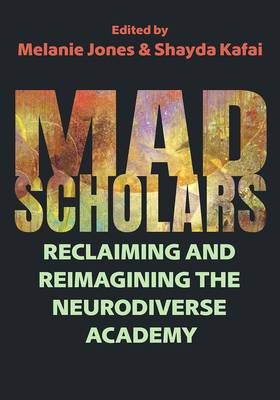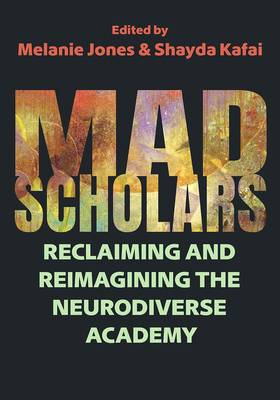
- Retrait gratuit dans votre magasin Club
- 7.000.000 titres dans notre catalogue
- Payer en toute sécurité
- Toujours un magasin près de chez vous
- Retrait gratuit dans votre magasin Club
- 7.000.000 titres dans notre catalogue
- Payer en toute sécurité
- Toujours un magasin près de chez vous
Mad Scholars
Reclaiming and Reimagining the Neurodiverse Academy
Sav Schlauderaff, Shawna Guenther, Rebecca Eli Long, Jess L. Wilcox Cowing, Sydney F. Lewis, Leah Lakshmi Piepzna-Samarsinha, Melanie Jones, Cache Owens
169,95 €
+ 339 points
Format
Description
As universities rethink their approaches to student and faculty mental health, this volume showcases academics who openly and proudly embrace the identity of "Mad scholar." In twenty-three essays--from contributors working in nearly a dozen disciplines and across three continents--Mad Scholars explores how neurodivergent scholars' work and lived experiences are richer because of their difference, not in spite of it. In doing so, these essays both expose the deep-rooted ableism that undergirds traditional mental health interventions and envision a more rigorous, more inclusive, and more outward-facing future for scholarly community and engagement, within and outside traditional academia.
A long-awaited corrective by scholars accustomed to having their stories told for them, this collection draws on Mad perspectives at the intersection of various marginalized identities, boldly dreaming of a future where all students and educators can thrive. By offering concrete steps and strategies that radically reimagine the current academic landscape, Mad Scholars opens our eyes to much-needed innovations in research, pedagogy, and community, ones which promise to transform higher education and create vital paths for scholarly innovation.Spécifications
Parties prenantes
- Auteur(s) :
- Editeur:
Contenu
- Nombre de pages :
- 396
- Langue:
- Anglais
- Collection :
Caractéristiques
- EAN:
- 9780815638476
- Date de parution :
- 15-08-24
- Format:
- Livre relié
- Format numérique:
- Genaaid
- Dimensions :
- 152 mm x 229 mm
- Poids :
- 757 g







